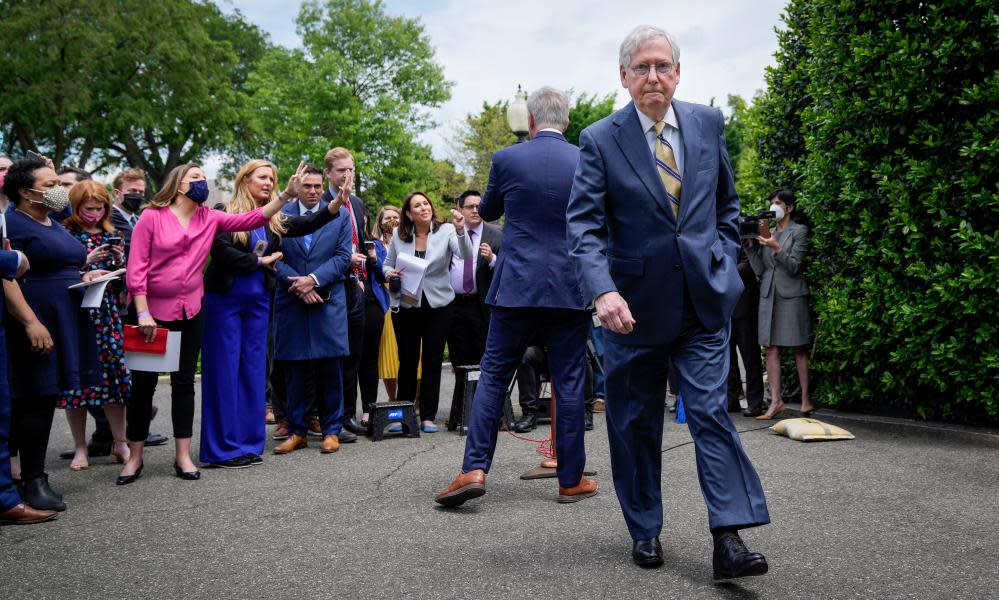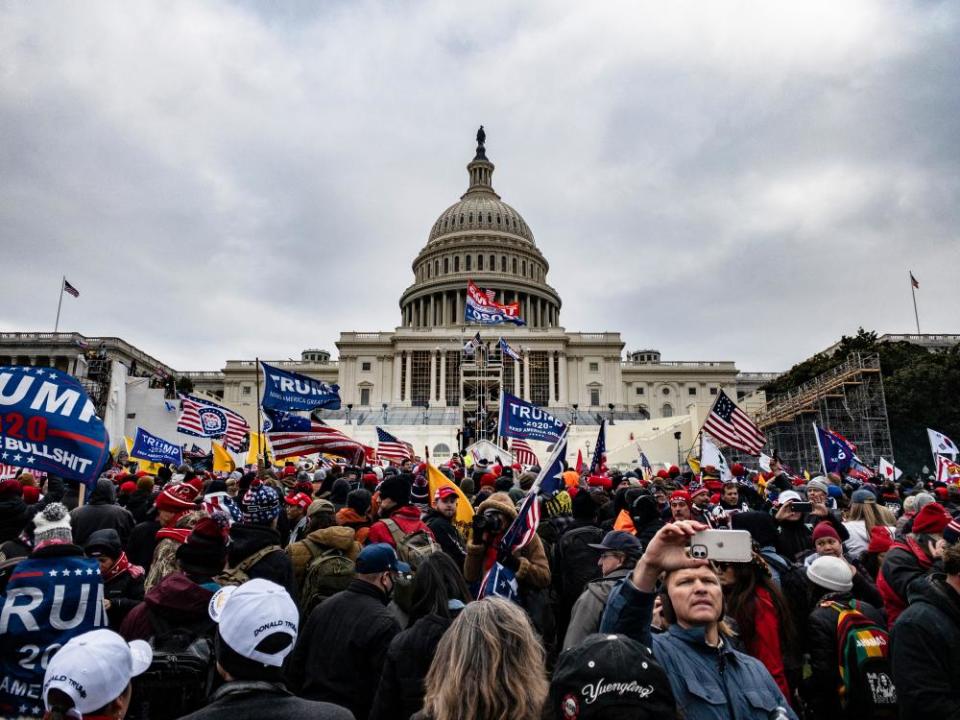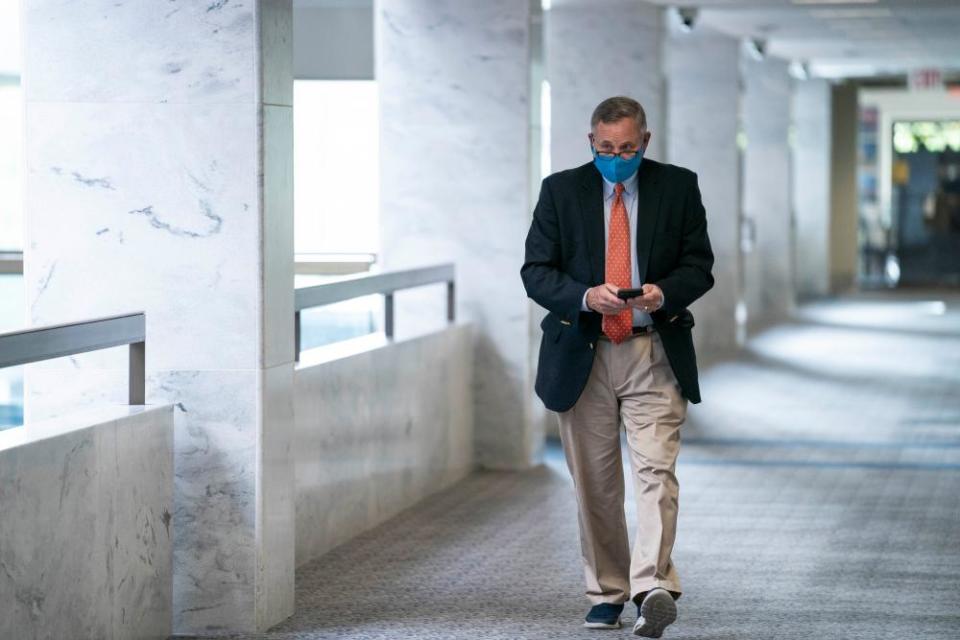Senate Republicans scramble to derail creation of Capitol riot commission

- Oops!Something went wrong.Please try again later.
- Oops!Something went wrong.Please try again later.
Top Senate Republicans are making a concerted effort to quash the creation of a 9/11-style commission to investigate the Capitol attack, deeply endangering the bill’s passage amid fears about what a high-profile inquiry into the events of 6 January might uncover.
The Republican Senate minority leader, Mitch McConnell, has said he opposes the commission bill in its current form and several Republicans who have previously expressed support said they could no longer back it.
Related: Investigate the Capitol attack? Republicans prefer to back the big lie
McConnell’s opposition brings into sharp relief the treacherous path ahead for the legislation, which Senate Democrats could introduce as soon as this week, according to a source briefed on the matter.
The reasons publicly offered by Republicans for rejecting the creation of a commission are myriad: it might impede existing congressional and justice department investigations into 6 January. It might become politicized. It might make pro-Trump rioters “look bad”.
But in the end, the stance reflects the fear from McConnell and top Senate Republicans that extending their support to an inquiry likely to find Donald Trump at fault for inciting the Capitol attack could be used as a cudgel against Republicans ahead of the 2022 midterm elections.
Both McConnell and House minority leader Kevin McCarthy are determined to put Republicans in the majority in both chambers next year, and both leaders regard the commission as an obstacle in their paths.
The political calculations looming large echo many of the same concerns that arose during the debate to establish the 9/11 commission, which was opposed by a Bush administration anxious that the disclosure of security lapses could jeopardise their 2004 election chances.
But while lawmakers then were able to put aside months of disagreements to form an inquiry – the bill passed in the House with three votes against and by voice vote in the Senate – the Capitol attack has become just another partisan issue in a divided Congress.
The positions of the two Republican leaders also underscores the fear of what a full accounting of 6 January might uncover about the roles that Republicans may have played ahead of the insurrection, potentially inviting unwelcome scrutiny of Trump’s lies about election fraud they helped promulgate.

The House minority leader, Kevin McCarthy, in particular could be left exposed should a 9/11-style commission ultimately be impanelled.
McCarthy called Trump as rioters breached the Capitol building and begged him to call them off, only for the former president to side with the rioters, saying they appeared to care more about overturning the election results than Republicans in Congress. Five people eventually died as the mob looted the Capitol and hunted for politicians, including Vice-President Mike Pence.
McCarthy, in his desperation, also spoke with senior White House adviser and Trump’s son-in-law, Jared Kushner, to try and stop the attack after his pleas to Trump went unheeded, a former administration source said.
Those conversations between Trump and McCarthy – addressing the crucial question of what Trump was doing and saying privately as the Capitol was overrun – would almost certainly be examined, raising the specter that McCarthy himself would have to testify, voluntarily or under subpoena.
“My humble opinion is that there’s some information that [McCarthy] would deem troubling for the Republican party if it got out. And I think he will do everything possible to prevent that,” said the House Democrat Bennie Thompson.
McCarthy is also vulnerable to having his own senior aides investigated by a 6 January commission, having hired Brian Jack, the former political director of the Trump White House, who was involved in organizing the “Stop the Steal” rally that preceded the Capitol attack.
The bill to create a 9/11-style commission passed the House on Wednesday with bipartisan support after 35 Republicans, in a stinging rebuke, defied McCarthy and an emergency recommendation from the office of the House minority whip, Steve Scalise, to oppose the legislation.
But McConnell’s new resistance – a reversal from his previous openness to having a commission, as well as his sharp denunciation of Trump for inciting the Capitol attack – betrays the fraught political situation the bill faces in the Senate.
The bill, in its current form, would need the endorsement of at least 10 Senate Republicans before it can be brought to the floor for debate. It would also need 10 Senate Republicans to cross the aisle and join Democrats to defeat an expected filibuster.
Senate Democrats could chart a narrow path to 10 votes based on the seven Republicans – Mitt Romney, Susan Collins, Lisa Murkowski, Richard Burr, Bill Cassidy, Ben Sasse and Patrick Toomey – who voted to convict Trump at his second impeachment trial.

The Senate majority leader, Chuck Schumer, and his leadership team were still hopeful in recent days of securing enough bipartisan support to push the bill through, according to a source familiar deliberations, with other Republicans, such as Rob Portman, remaining undecided.
The Senate minority whip, John Thune, who has been bullish about the prospects of having a commission to tightly focus on 6 January and not unrelated leftwing violence, as suggested by McCarthy, has previously said that Republicans had not yet whipped against the bill.
Zach Wamp, a member of the original September 11 commission and the former top Republican on the committee overseeing the US Capitol Police, condemned efforts from Republicans to doom an inquiry into 6 January.
“We need to know exactly what happened,” Wamp said. “So I would appeal to my fellow Republicans in the House and the Senate: do the right thing here. We need to actually clear this up; do it together as Americans. Put our country above any political interests.”
But the bill’s chances of becoming law hit a further snag last week after at least one senator who voted to convict Trump announced he would oppose the commission. “I don’t believe establishing a commission is necessary or wise,” Burr said in a statement.

